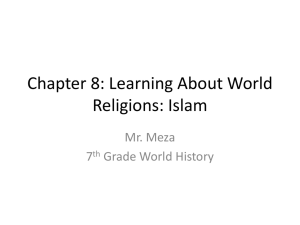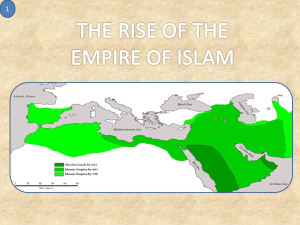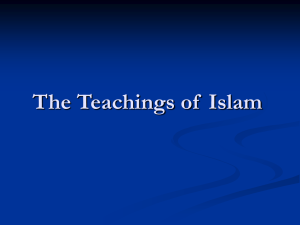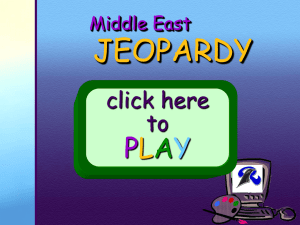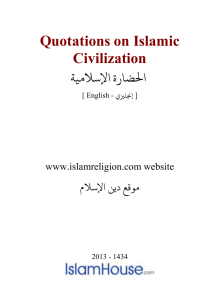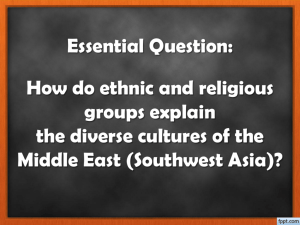MENA history notes
advertisement
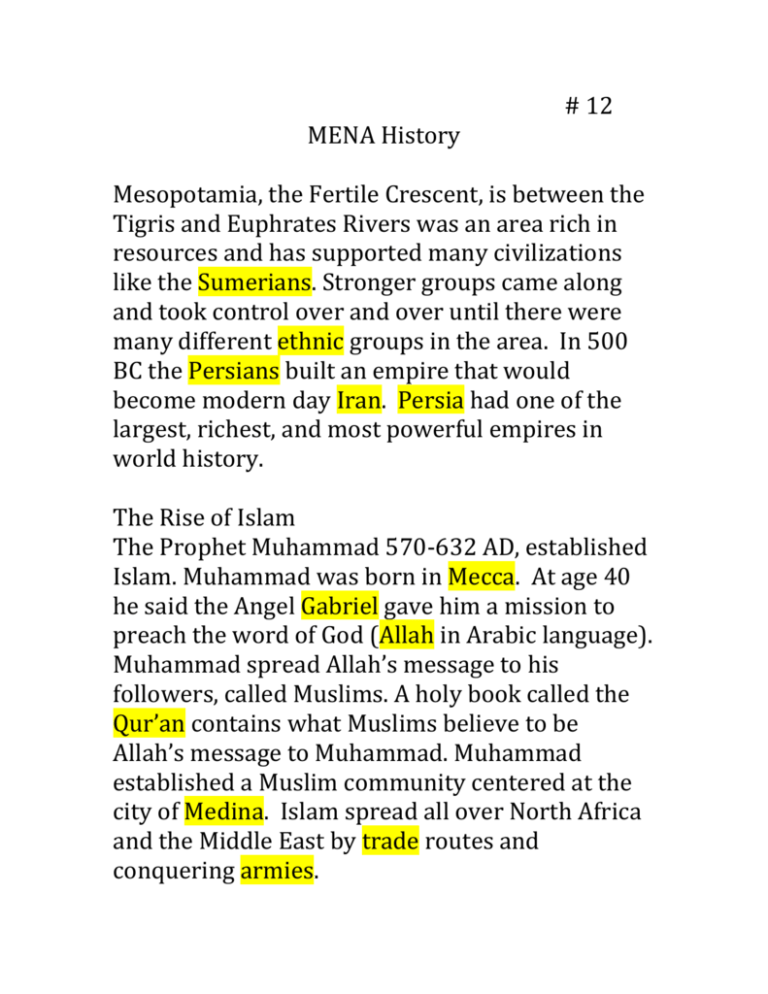
MENA History # 12 Mesopotamia, the Fertile Crescent, is between the Tigris and Euphrates Rivers was an area rich in resources and has supported many civilizations like the Sumerians. Stronger groups came along and took control over and over until there were many different ethnic groups in the area. In 500 BC the Persians built an empire that would become modern day Iran. Persia had one of the largest, richest, and most powerful empires in world history. The Rise of Islam The Prophet Muhammad 570-632 AD, established Islam. Muhammad was born in Mecca. At age 40 he said the Angel Gabriel gave him a mission to preach the word of God (Allah in Arabic language). Muhammad spread Allah’s message to his followers, called Muslims. A holy book called the Qur’an contains what Muslims believe to be Allah’s message to Muhammad. Muhammad established a Muslim community centered at the city of Medina. Islam spread all over North Africa and the Middle East by trade routes and conquering armies. Since 1299 the Muslims ruled the empire which spanned SE Europe, North Africa, and the Middle East. Mongols, Safavid and finally Ottoman Turks all ruled the region in turn. WWI was Britain, France, Russia, and the U.S. (the allies) against Germany, Austria-Hungary, and the Ottoman Empire. Several European countries colonized and controlled North Africa and the Middle East to harvest its resources namely, oil and gas. Most people in the area are Arabs and Arabic is the dominant language. Another major ethnic group are the Persians in Iran and Afghanistan who speak Farsi. Kurds are another ethnic group that are Muslims but not Arabs, they speak a language related to Farsi. In Afghanistan the Pashtun make up a large part of the population. Much of the conflict today is a result of decisions made after WWI. The Victorious Allies divided up the Ottoman Empire and messed up old national boundaries. Groups that never had to get along were now forced to live together. Ethnic Groups of MENA Arabs Persians -Largest ethic group of -Dominate in Iranian the entire region society and politics -Arabic language -Most speak Farsi dominant -Practice Islam -Practice Islam Kurds Pashtun -Members in Iran, Iraq, -Largest ethnic group in Syria, Turkey Afghanistan -Desire self-rule -Speaks Pashtu language -Language related to -Loyalty to tribe and Farsi family -Practice Islam -Practice Islam About Islam: Islam is split into two main branches. Sunni and Shi’as. One difference is who can become a religious leader or Imam. Sunni groups choose who they want to be leaders. Shia groups choose decedents of Muhammad. 90% of Muslims are Sunnis. Both are expected to pray 5 times and day and read from the holy Qur’an and if possible make a pilgrimage to Mecca at least once in a lifetime. The change to oil and gas production made huge changes in the region. One big early change was colonization from Europe, especially Britain. Academic Vocabulary Civilization-- the stage of human social development and organization that is considered most advanced. Ex) The first human civilization was in Mesopotamia. Ethnic group-- people of the same race or nationality who share a distinctive culture. Ex) Arabs are the largest ethnic group in the Middle East. Nationalism-- Patriotic feelings about one’s nation or homeland. The desire to self-govern (run your own country) as a group. Ex) The Kurds display nationalism when they fight for an independent country of their own. Interdependence-- mutuality: a give and take relationship where both groups or countries need something from the other. Ex) MENA shows its independence on the world when it grabs land in other countries for crops. Globalization—depending on and being affected by the whole world. Ex)The Middle East has a globalized oil trade. Fundamentalism-- a form of a religion, especially Islam or Protestant Christianity, that upholds belief in the strict, literal interpretation of a holy book. Ex) The Islamic Revolution in 1979 introduced a strict interpretation of the Qur’an as the law of the land. Human rights-- rights that are believed to belong justifiably to every person.


